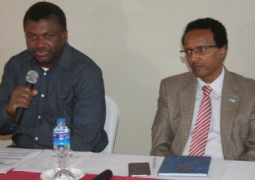Technical Advisory Committee members in the Central River Region recently took part in a day long sensitization meeting on energy efficiency and conservation held at the regional forestry bantaba.
Speaking at the forum, Modou Manneh, Senior Energy Officer, highlighted the government's commitment to the provision of adequate, reliable, efficient and affordable energy to support the socio-economic development of the country.
According to him, electricity as a form of energy is among the most important energy sources in The Gambia that has a profound bearing on people’s well-being. "Electricity is the most convenient form of energy because it can be used to power all forms of demand such as water pumping, cooking, factories and production plants," he stated.
Mr. Manneh pointed out that unlike in other countries, The Gambia generates all its electricity from thermal generators which, he added, is the most expensive form of electricity generation process, using either heavy or light fuel oils.
"It is against this background that the Government adopted a policy to promote energy efficiency and conservation under the Ministry of Energy," he added. According to him energy efficiency and conservation is a fundamental component of the Ministry's strategy to provide sources of energy including electricity to every Gambian.
For his part, Alhagie Cham, Electricity Planning Manager at NAWEC, revealed that one of the objectives of NAWEC is to ensure that there is adequate and efficient power supply in the country as well as a corresponding expansion of the generation, transmission and distribution networks. "Energy is a vital input to economic development and studies have shown a direct relationship between national GDP growth and total energy consumption," he noted.
Moses Cambell, an electric engineer with PURA, announced that compact fluorescent lamps (CFL) have more advantages than ordinary bulbs in terms of cost, energy consumption and average life span. According to him, the use of energy saving bulbs will significantly contribute to energy savings, with resources used for other development projects and to address the other socio-economic needs of the country.
National electricity demand is expected to continue growing fast, because of the expansion in economic activities that the country is experiencing, he added.
Read Other Articles In Article (Archive)



